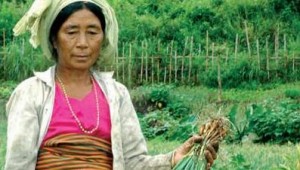“I know all about food security,” says Mitharam Maslai, a farmer from India’s Northeast highlands. “We ate only pumpkin and bamboo shoots every year for two to three weeks because we had run out of rice.”

Using a traditional ‘slash and burn’ method of farming known as jhum, indigenous villagers in this remote region were not producing enough rice to feed their families for the entire year. To address this problem, the International Fund for Agricultural Development (IFAD) started a project to introduce new farming methods to the region—emphasizing sustainable resource management—in the states of Meghalaya, Manipur, and Assam.
Environmental degradation was deepening the problem—people, not surprisingly, depend on the exploitation of natural resources to get them through the lean periods. Forest fruits and vegetables, medicinal plants, timber, and charcoal were often overharvested to supplement diets and incomes, contributing to deforestation, erosion, and loss of biodiversity.
Northeast India is considered a biodiversity hotspot and contains some of the subcontinent’s last remaining rainforest. The ethnic minority communities that inhabit the region live in economic and cultural isolation, and in extreme poverty. Jhum has worked sustainably in the past, but on a much smaller scale. In order to meet food requirements for a growing population, large-scale production has expanded the area under jhum cultivation further into forests. As the fragile ecosystem degrades, jhum has become less productive and more frequent, exacerbating food insecurity.
The IFAD-supported project promoted sustainable environmental management practices in over 1,000 villages, including reforestation and the inclusion of dispersed trees in crop fields. Protected areas were established around project villages, and communities own and manage wildlife and fish sanctuaries. Communities have also designated forest reserves for specific needs, like bamboo and timber extraction and protection of water resources. Villagers have now seen a resurgence of wildlife, including deer, elephants, and tigers. Now that environmental awareness has curbed the destructive practice of using poisons for fishing, villagers are able to supplement their diets with the rebounded populations of rohu and hilsa fish. Fish are an important source of protein and an integral part of the region’s indigenous cuisines.
Farmers were also taught terracing, promoting sedentary agriculture as an alternative to shifting, land-intensive jhum cultivation. They were encouraged to maintain crop diversity by planting tea, oranges, and other fruit trees, and practice soil and water conservation through agroforestry and the use of water harvesting ponds. As a result, productivity increased, offering not only year-round food security, but extra income to farmers.
The project “has given people the capacity to plan and manage their own resources. This makes the project’s interventions truly sustainable for the future,” says IFAD’s Country Program Manager for India, Mattia Prayer Galletti. Jhum cultivation has been reduced by 50 percent since the project began. Fields are allowed to lie fallow for longer periods of time between cultivation years, allowing the soil to regenerate more fully.
Grassroots organizations supported by IFAD also extended micro-credit to women’s self-help groups in the villages. With these funds the women have created small businesses, such as livestock operations and small local grocery stores. Villagers have also created small businesses by sustainably utilizing forest resources with enterprises including bee-keeping and silk production.
Now that villagers are able to sustain healthy lifestyles with their own resources, the whole community has benefitted from improvements in project areas. Infant mortality has declined, school enrollment has increased, and women are participating in village-level decision-making. IFAD is now planning to repeat this project on an even broader scale—to include the states of Mizoram, Tripura, Nagaland, and Arunachal Pradesh—hoping to help the entire region maintain and benefit from their rich and unique biodiversity.

Danielle Nierenberg, an expert on livestock and sustainability, currently serves as Project Director of State of World 2011 for the Worldwatch Institute, a Washington, DC-based environmental think tank. Her knowledge of factory farming and its global spread and sustainable agriculture has been cited widely in the New York Times Magazine, the International Herald Tribune, the Washington Post, and
other publications.
Danielle worked for two years as a Peace Corps volunteer in the Dominican Republic. She is currently traveling across Africa looking at innovations that are working to alleviate hunger and poverty and blogging everyday at Worldwatch Institute’s Nourishing the Planet. She has a regular column with the Mail & Guardian, the Kansas City Star, and the Huffington Post and her writing was been featured in newspapers across Africa including the Cape Town Argus, the Zambia Daily Mail, Coast Week (Kenya), and other African publications. She holds an M.S. in agriculture, food, and environment from Tufts University and a B.A. in environmental policy from Monmouth College.










